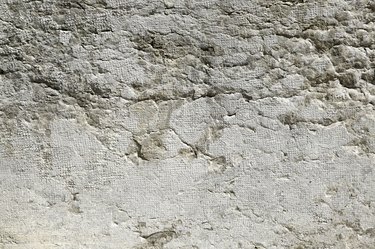Things You'll Need
Mortar mix
Wheelbarrow
Water
Trowel
Curing compound
Spray bottle
Breathable sealer
Paint tray
Paint roller

Mortar is a type of building material made from cement, lime and sand. It is used between blocks or bricks during installation. Mortar is mixed with water until it gets to a consistency similar to peanut butter, and is then is used with bricks. To help protect the mortar from the outside elements, it is necessary to cure it. Curing mortar will help it last longer and perform better. If it is raining when you are trying to cure the mortar, that is just another added element you will have to overcome.
Step 1
Set the bags of mortar in a large wheelbarrow big enough to fit the mortar and all of the water. Open up the bags and dump out the mortar. Cover the wheelbarrow with some type of overhang or mix it up in the garage to avoid the rain.
Video of the Day
Step 2
Add water to the mortar mix and begin mixing it together. Stir it up with a trowel and continue adding water until there is no dust left and all of the mortar has been covered in the water. Turn it over and get to the bottom to ensure the mortar is mixed up properly.
Step 3
Pour a mortar curing compound into a spray bottle and spray the compound into the mortar mix by hand. Start on one end of the mortar and spray up and down directly across to the other side. Cover the entire surface with the spray so nothing is left exposed.
Step 4
Install the mortar with the bricks and then apply a breathable sealant over the mortar. Pour the sealant into a paint tray and apply it directly to the blocks and the mortar after it has dried with a paint roller. This will help seal any cracks in the mortar.
Step 5
Spread it out over the entire surface in a smooth even line until the surface is covered entirely. Wait one hour for it to dry and inspect the area. Verify everything is sealed.
Video of the Day